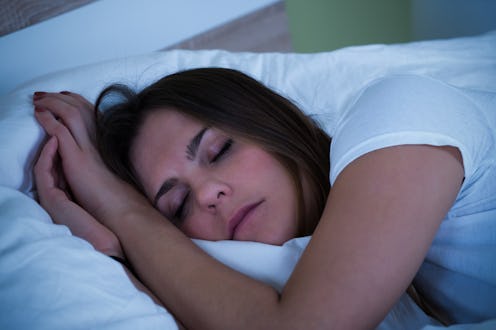Life
5 Key Ways Getting 5 Hours Of Sleep Messes With You When You Work A 9-5

Do you habitually get less than five hours of sleep a night? A 9 to 5 gig may not feel like the best fit for you — and science is, largely, in agreement. It's rare for people to naturally flourish on five hours of sleep a night; a study in 2016, reported Fast Company, found that even six hours of sleep had the same neurological impact as pulling a complete all-nighter, complete with mood swings and poor performance on tests. You might hope that a steady office job might sort out your sleep schedule — but, depending on your natural circadian rhythms and the way your job works, you're likely just building up a serious amount of sleep deprivation that will affect your performance over time.
The 9 to 5 workday is a modern invention, and increasingly researchers don't believe it's the best fit for the majority of the population — particularly because it leaves so many of us sleep-deprived. Many people working standardized job hours sleep less than they should; 45 percent of Americans in a 2014 study by the National Sleep Foundation reported poor or insufficient sleep at least once a week, which had knock-on effects on their life — and their work. Here's how a 5-hour-a-night sleep schedule will affect a 9-to-5 job.
1You'll Experience Drops In Productivity
Five hours a night means you're likely operating on a serious amount of sleep debt, and that will affect your productivity: making small mistakes, missing cues, suffering from memory lapses, and other issues that will depress your performance in your workplace. As Fast Company explained in 2016, "Even just a little bit of sleep deprivation, in this case, six rather than eight hours of sleep across two weeks, accumulates to jaw-dropping results." Can't make your sleep schedule and your day schedule mesh? You're not looking at good performance overall.
2You Won't Lead As Well As You Could
Interestingly, the impacts of a 5-hour sleep schedule don't improve as you're promoted in a 9 to 5 job. The Harvard Business Review reported in 2018 that "studies have found that when leaders show up for work unrested, they are more likely to lose patience with employees, act in abusive ways, and be seen as less charismatic. There is also a greater likelihood that their subordinates will themselves suffer from sleep deprivation — and even behave unethically."
While many of us know the myth of the high-performing, no-sleep boss, that's actually very rare; GQ reported in a 2016 piece that these 'short sleepers' tend to be genetic anomalies who don't suffer from sleep deprivation in the same way that others do. Instead, bosses may push themselves to fit this persona and end up being worse at leadership in the process.
3The Regularity May Help Your Sleep More — Or It May Not
If you chronically get five hours per night, you may be hoping that an eight-hour workday with regular wake-up times might help you regulate your sleep clock. This could actually work; the body's circadian rhythms, our natural rhythms of waking and sleeping, can be influenced by environment, particularly if we take steps like seeking out sunlight to wake us up and making sure rooms are dark and quiet when we want to sleep. Regular sleeping and wake schedules can also help it shift. However, if you can't shift your sleep schedule no matter what you do, you might have another issue that's keeping you out of step with the 9-to-5 grind: delayed sleep phase syndrome.
People with the syndrome, reported The Atlantic in 2015, "have internal clocks that run at least two hours slower than normal, giving them "social jet lag" which is pretty much what it sounds like: They’re out of sync with the rest of society." It's more common in kids and teens, according to the Cleveland Clinic, but it does happen in adults, and if your limited sleep occurs because you don't get to sleep till very late, you may find that this is the cause.
4You May Behave Unethically At Work
Habitual sleep deprivation plus an office job that has you making big decisions is not a great combination, according to science. Healthline reports that unethical behavior on the job has been found to be linked to sleep deprivation among workers. Apparently, this is because sleep deprivation lessens our self-control and makes us more vulnerable to temptation and bad decisions, which we wouldn't necessarily make while well-rested. You won't be able to steal from your job and plead sleep deprivation as an excuse, but it does mean your normal parameters of ethical behavior might change.
5It May Get Easier As You Get Older
One of the major reasons scientists argue the 9-to-5 work day doesn't work is that, perversely, it works very well for one group of people: those over 50. Dr. Paul Kelley of Oxford University said in 2016 that the workday should start at 10 a.m. because humans don't naturally feel peak alertness at 9 a.m. until we're 55.
As we get older, not only do we become alert earlier in the day, we also naturally sleep less. It will likely be easiest to reconcile five hours of sleep a night with a 9-to-5 work schedule when you're nearing retirement. Which is definitely not the way the working world should actually work.
6
Sleeping for five hours a night or less will not be helped by a 9-to-5 position unless you're one of the lucky ones who can shift their sleep schedule, or operates happily on minimum sleep. Otherwise, it's worth attempting to lengthen your time in deep sleep.